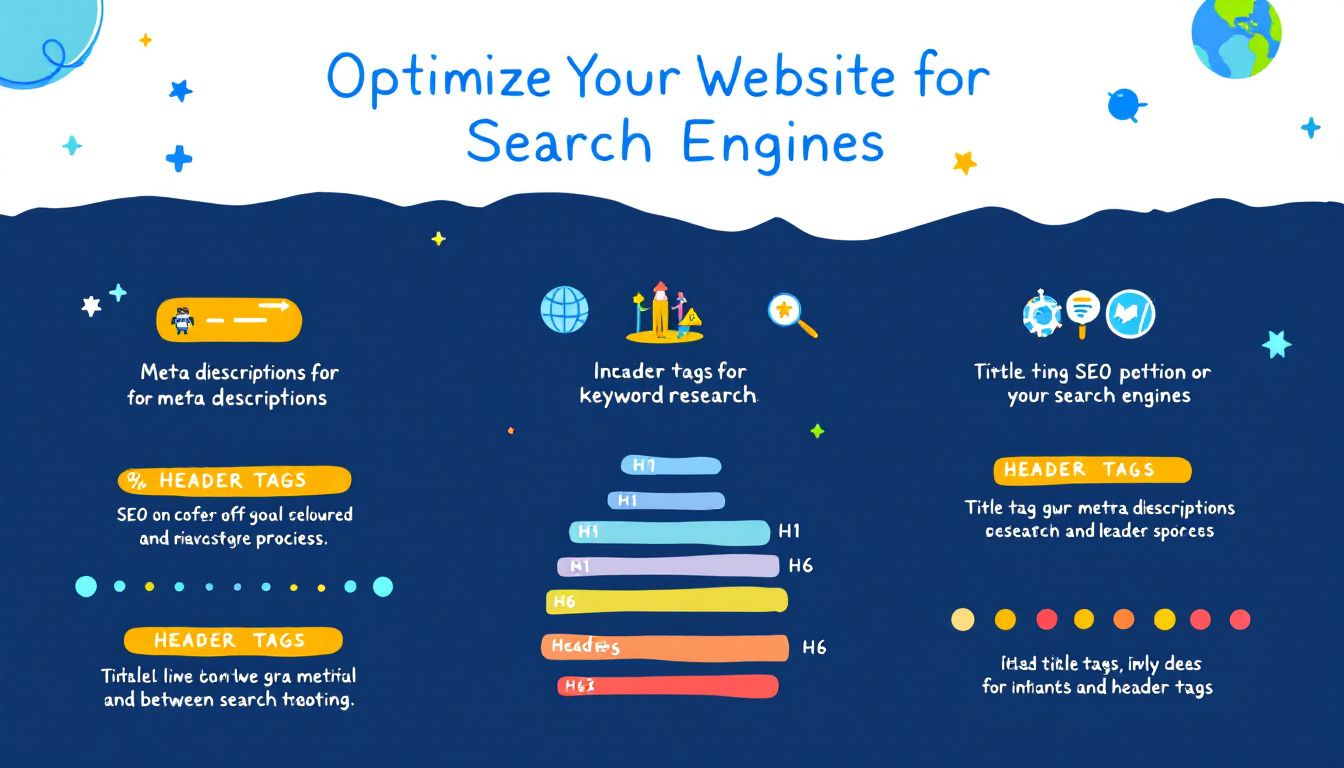Learn how you can improve your search engine rankings and drive more organic traffic with effective SEO methods. This article covers the 10 best SEO methods, from keyword research to technical SEO, to help your site gain visibility.
For a comprehensive introduction to the fundamentals of search engine optimisation, visit our Learn Search Engine Optimisation guide.
Key Takeaways
- Effective keyword research forms the foundation of SEO, guiding content creation to align with user search intent and improve rankings.
- On-page SEO optimisation is critical, involving proper use of title tags, metadata, and structured content to enhance visibility and user experience.
- Regular tracking and audits of SEO performance metrics help identify improvement areas and adapt strategies in line with evolving search engine algorithms.
Comprehensive Keyword Research

Keyword research is the cornerstone of any effective SEO strategy. It helps you understand what your audience is searching for and how to position your content to meet those needs. Mastering keyword research drives substantial organic traffic to your site and improves search engine rankings.
For step-by-step guidance on DIY keyword research, check out our DIY SEO Marketing guide.
Importance of Keyword Research
Keyword research helps understand search queries and user search intent. Identifying relevant keywords allows you to create content that meets user needs and ranks high in search engine results. Understanding search volume and competition levels helps you gauge the potential visibility of a keyword and adjust your SEO strategies accordingly.
Effective keyword research involves assessing keyword competition to refine your strategy and determine ranking difficulty.
Tools for Keyword Research
Various tools can assist in keyword research. SEMrush, Ahrefs, and Google Search Console are popular options that can help identify high-performing keywords and increase organic traffic. These tools provide insights into average monthly searches, competition levels, and other critical metrics that inform your SEO strategy.
These tools help you find search volumes and perform competitive analysis to target the best keywords for search engine visibility.
Implementing Long-Tail Keywords
Long-tail keywords, which are specific and extended phrases, attract relevant traffic and are easier to rank for than broad terms. They generally have lower competition and higher conversion rates, making them an effective strategy for driving more organic traffic.
On-Page SEO Optimisation

On-page SEO involves optimising individual web pages to rank higher and attract more relevant traffic in search engines. Key elements include content, metadata, header tags, and overall page structure. Effective on-page SEO enhances both user experience and search engine visibility, making it a critical component of any SEO strategy.
For an in-depth exploration of on-page SEO, visit our guide on how to get your website to come up on Google.
Crafting Effective Title Tags and Meta Descriptions
Title tags and meta descriptions are vital for improving click-through rates and search engine visibility. Including main keywords at the start of title tags and creating unique, descriptive meta description for each page can significantly enhance your SEO performance.
Optimising Header Tags
Header tags organise content on a page, making it easier for both users and search engines to navigate. Properly structured header tags help search engines understand the content hierarchy, improving the chances of ranking higher in search results.
Image Optimisation Techniques
Optimising images is essential for enhancing site speed. It also plays a significant role in improving user experience. Descriptive filenames and alt text can enhance SEO by making it easier for search engines to index images. Regularly auditing images for issues like broken links and missing alt text can also boost visibility and SEO performance.
Using tools like the Site Audit tool to identify and resolve these issues ensures ongoing optimisation and improved search engine rankings.
Enhancing User Experience (UX)

A good user experience (UX) is critical for SEO as it helps Google’s crawlers scan content and determine SERP rankings. Enhancing UX improves user engagement and influences search engine rankings based on how users interact with your site.
Improving Site Speed
Page speed significantly impacts user satisfaction and search engine rankings. Compressing images, caching, and cleaning up code are effective methods to improve site speed and enhance SEO performance.
Mobile-Friendly Design
With over 60% of web traffic coming from mobile devices, mobile optimisation is crucial for SEO performance. Ensuring your site’s style, structure, and page speed are optimised for mobile can improve user experience and search engine rankings.
Easy Navigation and Clean URL Structure
Creating a clear and organised site structure enhances user experience and increases user engagement. Easy navigation and clean URL structures help users find information quickly and improve search engine rankings.
Building High-Quality Backlinks

High-quality backlinks are essential for demonstrating a website’s authority, leading to higher search rankings and increased traffic quality. Backlinks signal to search engines that your site is credible and relevant, enhancing your site’s legitimacy in search rankings.
Guest Blogging
Guest blogging involves writing articles for reputable websites that include backlinks to your own site. This practice helps build high-quality backlinks and increases online visibility.
Broken Link Building
Broken link building involves finding non-working links on other websites and suggesting your own content as a replacement. This technique helps acquire high-quality backlinks and improves SEO rankings.
Digital PR and Outreach
Digital PR strategies can help forge connections with influential sites, facilitating the acquisition of high-quality backlinks. Outreach efforts, such as sharing press releases and conducting original research, can significantly boost your site’s authority and search engine visibility.
Content Marketing Strategies

Content marketing focuses on the creation of valuable content. Its goal is to distribute this content to attract and engage your audience. High-quality blog posts, cornerstone content, and shareable content are essential components of an effective content marketing strategy.
Blogging for SEO
Maintaining a regular blog post schedule is crucial for building authority with search engines and keeping readers engaged. Consistent blogging can significantly improve your website’s SEO performance and attract more organic traffic.
Creating Cornerstone Content
Cornerstone content refers to in-depth, high-value material that covers key subjects comprehensively. This type of content positions your website as a trusted authority on specific topics.
Producing Shareable Content
Creating content that resonates emotionally increases its chances of being shared on social media. Shareable content can significantly boost your site’s visibility and attract more organic traffic.
Technical SEO Best Practices
Technical SEO focuses on optimising a website’s infrastructure and back-end coding to improve accessibility for search engines and users. Key tasks include improving site load time, configuring robots.txt files, and setting up redirects.
XML Sitemaps and Robots.txt
XML sitemaps and robots.txt files play critical roles in ensuring that search engines effectively crawl and index a website. These tools guide search engines by specifying which pages they can or cannot crawl, enhancing overall SEO performance.
Structured Data Markup
Incorporating structured data can improve search engine comprehension of webpage content, often resulting in enhanced visibility through rich snippets.
Core Web Vitals
Core Web Vitals are crucial metrics used by Google to evaluate a website’s user experience. Improving these metrics can directly influence search engine rankings and overall user satisfaction.
Local SEO Techniques
Local SEO is the practice of improving search engine visibility for local business locations. It helps businesses grow by increasing their presence in local searches.
Optimising Google My Business
Claiming and optimising your Google My Business listing is crucial for local SEO. Include essential information and regularly update your listing to maintain accuracy and enhance visibility.
Local Citations and Reviews
Consistency in local citations across various platforms builds trust and credibility for local businesses. Encouraging customer reviews can significantly improve your local search ranking and attract new customers.
Targeting Local Keywords
Incorporating local keywords helps attract relevant search queries from users in nearby locations. This strategy can enhance your business’s visibility in local search results and the local map pack.
Staying Updated with Algorithm Changes
Staying updated with algorithm changes is essential to maintain high search rankings and competitiveness in SERP. Regularly monitoring algorithm updates helps you adjust your strategies effectively for better search rankings.
Monitoring Google Algorithm Updates
Tools like Google Analytics and SEMrush can help track traffic changes due to algorithm updates. Staying informed of these changes is necessary to adapt your strategy effectively.
Adapting SEO Tactics
Adaptation of search engine optimisation tactics is crucial to maintain top search rankings and attract organic traffic. Consistent review and refinement of SEO tactics help keep a website competitive in search results.
Reliable SEO News Sources
Multiple online resources are available for keeping up with the latest SEO trends and best practices. Reputable sources for SEO news include Search Engine Journal, Search Engine Roundtable, and Search Engine Watch.
Tracking and Measuring SEO Success
Effective tracking allows for the objective assessment of what aspects of an SEO campaign are successful or need adjustment. Monitoring SEO progress is important to evaluate impact and discover improvement opportunities.
Google Analytics and GA4
Google Analytics offers insights into user engagement and conversion rates, essential for assessing SEO performance. GA4 introduces event-based tracking, enabling more granular data collection on user interactions.
Key SEO Metrics
Essential SEO metrics include organic traffic, bounce rate, and average session duration, which collectively help in evaluating the effectiveness of SEO strategies. Metrics like organic traffic growth indicate the success of SEO efforts in attracting visitors.
Regular SEO Audits
Regular SEO audits are vital for understanding the overall health of your website and ensuring that it remains competitively optimised. Performing regular audits ensures that your SEO strategies evolve with changing algorithms and market dynamics, which can prevent sudden drops in search engine rankings.
SEO audits help identify technical issues, such as slow page speeds or broken links, that can negatively impact your site’s performance. Systematically evaluating your site’s SEO health with tools like Google Analytics and website crawlers uncovers underperforming content for optimisation, which can improve your visibility on search engine results pages.
Summary
In summary, mastering SEO involves a combination of effective keyword research, on-page optimisation, enhancing user experience, building high-quality backlinks, and consistent content marketing. By staying updated with algorithm changes and regularly tracking your progress, you can ensure ongoing SEO success. Implement these strategies to not only improve your search engine rankings but also to attract and retain more organic traffic. Take these insights, apply them diligently, and watch your organic traffic soar.
Frequently Asked Questions
Why is keyword research important for SEO?
Keyword research is crucial for SEO as it helps identify what your audience is searching for, enabling you to create relevant content that boosts search engine rankings and increases organic traffic.
How do I improve my site’s load speed?
To enhance your site’s load speed, compress images, utilise caching tools such as WP Rocket, and streamline your code. Additionally, regularly monitor your performance with tools like Google’s PageSpeed Insights to ensure continual improvement.
What are long-tail keywords and why should I use them?
Using long-tail keywords is essential because they attract targeted traffic with less competition, making it easier for your content to rank and resulting in higher conversion rates. This specificity helps connect your offerings with the right audience effectively.
How can I build high-quality backlinks?
To build high-quality backlinks, focus on guest blogging, broken link building, and implementing effective digital PR strategies. These approaches will significantly enhance your site’s authority and search engine rankings.
What tools can I use to track my SEO performance?
To effectively track your SEO performance, utilise tools such as Google Analytics and SEMrush, which offer valuable insights into user engagement and traffic trends. These tools can help you assess the effectiveness of your SEO strategies.
